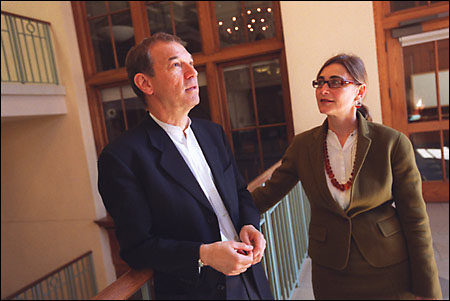Making a commitment to freedom of thought
Scholars at Risk provides a haven for threatened colleagues

In the 1930s and ’40s, many European scholars fleeing Nazi persecution found refuge at American universities where they were able to continue their research and writing as well as contribute their knowledge and experience to the academic communities in which they found a home.
In the late 1990s, Katie Trumpener, a professor of comparative literature at the University of Chicago (now at Yale), wondered whether American institutions of higher learning might again play such a role by providing a haven for scholars menaced by war, revolution, ethnic and religious conflict, or repressive regimes.
Trumpener discussed the idea with Jacqueline Bhabha, then a fellow faculty member and head of the university’s Human Rights Program. Bhabha was excited by the notion of scholars reaching out to help colleagues in need. Support from the university administration and a grant from the MacArthur Foundation made the idea a reality, and in 2000 the new program was launched as Scholars at Risk.
In 2002, Bhabha came to Harvard as the Jeremiah Smith Jr. Lecturer on Law, adjunct lecturer in public policy at the Kennedy School, and executive director of the Committee on Human Rights Studies. By this time, Scholars at Risk was well on its way to becoming an international network. At the present time it comprises about 100 member institutions in 16 countries.
Not long after Bhabha’s arrival, she happened to speak about the program with Renaissance literature scholar Stephen Greenblatt, the John Cogan University Professor of the Humanities. Greenblatt recently had been elected president of the Modern Language Association and was looking for human rights-related initiatives that he could encourage the 35,000 members of that organization to support. Scholars at Risk seemed like the right choice on a number of levels.
“It’s not simply a human rights initiative,” Greenblatt said. “It’s a program for scholars to connect with other scholars who find themselves in danger.”
So enthusiastic was Greenblatt about Scholars at Risk that he decided to bring it to the attention of Harvard President Lawrence H. Summers and ask for University support. Summers was soon convinced that Harvard could make a contribution to this effort and authorized funding to initiate the program on campus.
“The work of Professors Bhabha and Greenblatt – and the heroic work of the scholars this program supports – show a commitment to freedom of expression and inquiry that is a model for the world,” said Summers. “Universities have a crucial role in the preservation of these essential values.”
Greenblatt, who is the chair of Scholars at Risk at Harvard, explained that there is a perfect fit between the University’s cosmopolitan faculty and the aims of the program.
“Many of us at Harvard live in the global world. We have wide-ranging and rich connections with people in other parts of the scholarly community.”
These connections can be put to good use when it comes time to choose recipients of Scholars at Risk fellowships, which is done entirely through nominations from members of the Harvard community.
Likewise, when scholars come to Harvard, an effort is made to connect them with other scholars in their field.
“It’s very important that the scholars should be located in a department related to their own scholarly interests,” said Bhabha. “We wanted the academic community to be involved.”
Harvard’s program, which is connected to the international network but operates independently, has been growing as funding increases and as demand grows.
“This year there was such a number of marvelously impressive and moving applications that we asked President Summers to double his support, which he did. These are people whose lives are truly at risk, and you have to try to do as much as you can to help,” said Greenblatt.
In addition to Summers’ renewed support, philanthropists Sigrid and Lisbet Rausing have made a generous contribution to the program.
But despite its growth, the program can only accommodate a small percentage of the candidates whose cases are so urgently proposed. The situation makes for a difficult selection process.
“It’s a tough question of balancing the severity of risk with how a scholar might fit in a particular department. We’ve had many discussions about what constitutes risk and even what is a scholar. Not all of them are from university positions, but the program isn’t intended as a platform for advocacy,” said Bhabha.
Another difficulty is that the program can only provide support for one year. In cases where the scholar would still face grave danger upon returning to his or her native country, some effort may be made to find another position. But even when scholars have no choice but to return to their homeland and face regimes that have threatened them in the past, there may be some advantage to having spent a year at Harvard.
“Harvard has extraordinary name recognition, and it gives people enormous weight when they return. Repressive governments don’t like it when a spotlight is shown on their activities, and Harvard is a great spotlight. They know that we’re interested in these people,” Greenblatt said.




